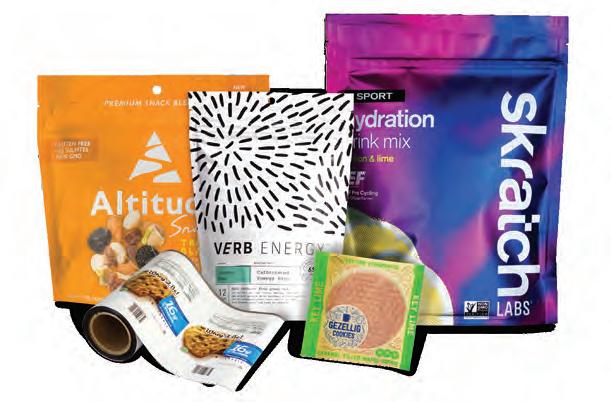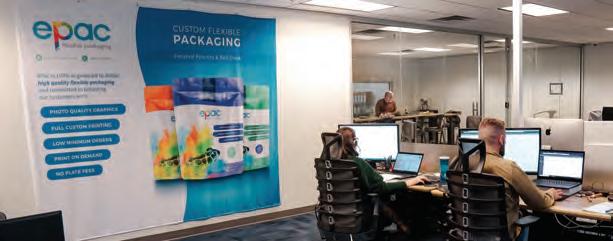
3 minute read
AUSTRALIAN MADE
ePac to provide large scale marketing for small businesses
ePac’s mission has always been about helping small brands obtain a big brand presence through packaging options. Food & Beverage Industry News reports.
Built entirely on digital printing technology from Hewlett Packard’s Indigo 25000, ePac can fast-track small businesses to the big brand market by facilitating economical short and medium run length jobs, customisation, and the ability to order to demand, to avoid costly inventory and obsolescence. ePac provides local businesses with high-quality finished pouches and roll stock at competitive prices for both short and medium run length orders.
The company serves brands of all sizes, with a particular focus on small- and medium-sized businesses producing snacks, confection, coffee, natural and organic foods, pet food, and nutritional supplements.
Early in 2022, ePac will launch its first production facility eight kilometres from the Melbourne CBD, at the new Newlands Road food manufacturing hub, located in Coburg’s industrial district.
The company’s goal is to become a go-to local packaging partner for Melbourne’s up and coming food and beverage businesses and support them on their journey to achieving big brand presence. ePac’s offerings aim to bring a new sustainable solution to the Australian food and beverage market.
Its packaging is a combination of recyclable films, suitable for store drop-off programs such as REDcycle and How2Recycle, and films made from post-consumer recycled (PCR) resin content.
Meanwhile, ePac’s “Order – to – Demand” model and low minimums that ship in 10-15 business days, can help customers reduce inventory and obsolescence, which decreases the amount of waste that enters recycling streams, landfills, and the environment. ePac’s digital printing platform is inherently sustainable; it uses less energy, produces less waste, and has a smaller carbon footprint than traditional printing technologies.
Additionally, ePac inks are recyclable and compostable.
The COVID-19 pandemic has highlighted the impact and instability of offshore production.
Sourcing from the overseas Asian markets caused an imbalance in supply and demand that led to stock shortages across supermarket shelves.
While many forecasts are circulating as to when international trade will balance out, and ePac spokesperson said the company feels that businesses need to accept longterm instability as supply and demand continues to ricochet.
Economically, it is thought that Australia is entering a period of scarcity and inflation on a global scale, the effects of which are going to be felt into 2023, which is going to place pressure on traditional supply chain models.
Through building its presence here, directly in the Australian market where ePac produce onshore, the company will be able to strengthen Australian supply chain partnerships by allowing businesses to deal directly with a local partner here in Australia.
In addition, quality is something that can never be fully ascertained when sourcing offshore.
For many companies, the investment in subpar packaging is a sunken cost that often leads to obsolescence – or lessens the quality of their brands.
It’s difficult to rectify production quality issues with overseas suppliers, so having a partner on the ground in Australia will enable ePac to deliver high production quality.
This is also a selling-point for ePac customers who are concerned about their impact on the environment and their carbon footprint when sourcing offshore.
The importance of sustainability of consumer products is of paramount importance to brand owners, and society is increasingly aware of the harmful environmental impact of over consumption.
The rise of the ethical consumer is changing buyer behaviour and companies must adapt to meet this need.
Packaging represents the key point as a sale brand communication medium, and it is paramount for brand owners to deliver their sustainability message effectively at this critical juncture.
This starts with sustainable material; content that is recyclable/ recycled or compostable, coupled with the right recycling logos to ensure correct end of life disposal.
Companies need to consider the sustainability of their products holistically including upstream supply chain and manufacturing processes to continue to thrive in this new market. It is inevitable that if industry does not meet this sustainability challenge, governments will move to legislate.
Smart and agile businesses will act now to be able to pounce on this changing consumer trend.
Epac’s value proposition has resonated with all the customers that the company has engaged.
The ability to bring production onshore with improved turnaround times, combined with a smaller minimum order size, while improving their environmental footprint, makes ePac appeal in different ways to different clients.
All these points have been raised by ePac clients and the company attributed its success to strong relationships with its clientele. F
ePac has the capability to get small businesses into the big brand marketing space. Early in 2022 ePac will launch its first production facility in Melbourne.











